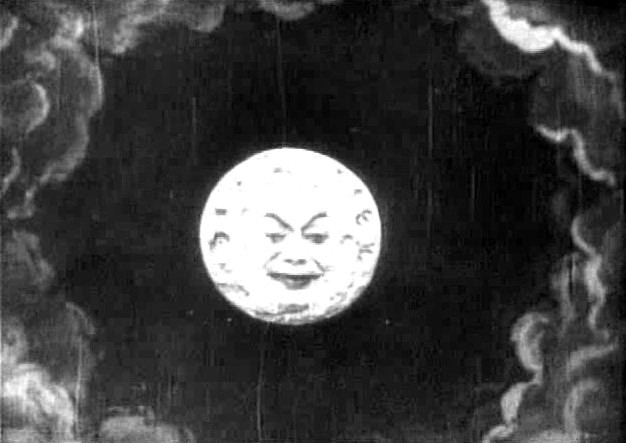Sunday, October 7, 2012
A Trip To The Moon (1902)
Georges Melies' place in the history of early cinema is secure, of course, as a pioneer of clever trick photography. But he's not really considered a filmmaker as such, a key innovator of film technique. He's more a curiosity, a novelty unto himself. And sure, that camera is resolutely static in all his films, plonked in the stalls like the faithful audience in a Parisienne theatre, but that doesn't mean his mise en scene was primitive. The story of early cinema is usually seen as one of growing narrative sophistication, progress through editing and montage, an evolving visual grammer allowing greater complexity of storytelling. Which is true but has the unfortunate side-effect of marginalising or undervaluing those who don't fit this arc. Melies brought his own talents, obsessions and experience to the medium in the same way Orson Welles utilised radio techniques in Citizen Kane. Melies teeming, inexhaustible imagination, his trickster delight in creating wonder in an audience is the well-spring of cinema every bit as much as Edwin S. Porter's parallel editing in The Great Train Robbery (1903). When the frame is this filled with business, with perspective-stylised scenery, with clever tricks and visual jokes, it seems churlish to ask for movement from the camera too. In this sense he could be seen as a precurser of fellow Frenchman Jacques Tati who similarly loved to fill the static frame with off-centre comic business. (Melies was assuredly comic. Those doddery old scientists with their funny walks and pratfalls have a pantomime charm to them). And yet there is movement of sorts. Check out those dissolves as we travel from earth towards the moon, first seen as a distant orb, then closer with vaguely face-like shadows, and finally that iconic moon-face about to be assaulted by the incoming rocket. There are earlier dissolves too, from the astronomical meeting to the workers making the rocket. But even so, the film doesn't need to justify itself in these terms. The imagination makes the real possible, it's the crucible of the future. Without Melies or HG Wells there wouldn't have been any Neil Armstrong. Which isn't to say he was just a bag of tricks, this is still a narrative film, a story told with breezy economy and impish invention.
Subscribe to:
Post Comments (Atom)

No comments:
Post a Comment